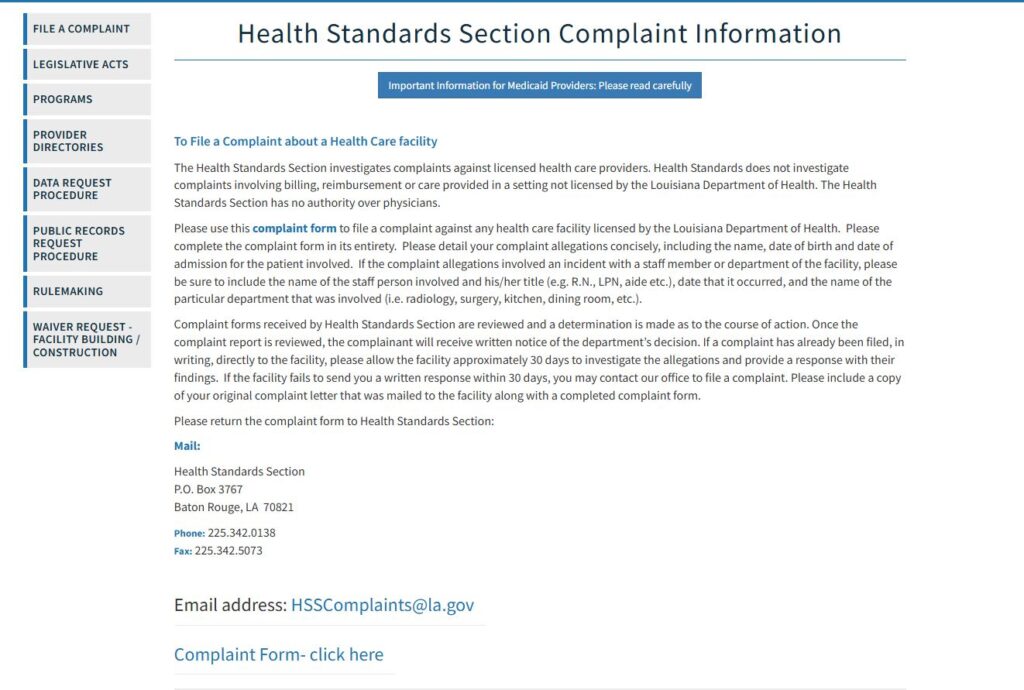By Garret DeReus, Updated January 10, 2025
The Louisiana Department of Health’s limited role in investigating abuse allegations at Intermediate Care Facilities creates significant risks for vulnerable residents. Understanding these limitations is crucial for families seeking justice and protection for their loved ones.
The Alarming Statistics Behind Investigations into Abuse at Intermediate Care Facilities
As detailed in our previous article Abuse and Neglect in Louisiana’s ICF System: Understanding the Oversight Crisis, recent data from Louisiana’s Intermediate Care Facilities (ICFs) reveals a troubling pattern of oversight gaps in abuse and neglect investigations. Between 2019 and 2023, ICF facilities self-reported an astounding 4,698 incidents related to abuse and neglect, yet, based on the available data, the Louisiana Department of Health (LDH) initiated investigations into approximately 32 of these cases – less than 1% of all reported incidents.
The investigation rate for direct complaints shows similar concerning trends. During the same period, LDH received 718 complaints about ICF facilities but investigated only 441 of these reports. This significant discrepancy between reported incidents and actual investigations raises serious questions about the oversight of these facilities and the protection of their vulnerable residents.
LDH’s Restricted Investigative Authority
According to the July 17, 2024 Louisiana Legislative Auditor’s report, “ABUSE AND NEGLECT IN INTERMEDIATE CARE FACILITIES FOR INDIVIDUALS WITH DEVELOPMENTAL DISABILITIES,” the LDH’s role is limited to identifying non-compliance with state and federal requirements. This narrow scope means that LDH cannot function as a comprehensive investigative body for abuse allegations, despite what many families might expect.
A crucial distinction exists between LDH’s authority and that of law enforcement. While LDH focuses solely on regulatory compliance, law enforcement agencies are responsible for investigating potential criminal activity related to abuse and neglect. This separation of duties can create confusion among families seeking justice for their loved ones.
The challenges of investigating abuse allegations in ICF settings are particularly complex due to the unique needs of residents with disabilities. Effective investigations require specialized skills in communicating with individuals who may have significant cognitive or communication difficulties. Many residents may be non-verbal or require alternative communication methods, making standard interview techniques ineffective. Additionally, some residents may have difficulty accurately recalling or expressing their experiences due to their disabilities. These investigations demand extensive time, patience, and expertise to gather accurate information – requirements that cannot be met through cursory telephone investigations or brief facility visits. The absence of witnesses or video surveillance can further complicate the gathering of evidence. These challenges underscore why thorough and detailed investigations with sufficient time and resources are essential for protecting vulnerable residents.
The Investigation Process: A Critical Look
Louisiana law, specifically RS 40:2009.14, outlines the procedures for complaint investigations, but these methods often fall short of what many would consider a thorough investigation. The law permits the LDH to conduct investigations by telephone, review of a provider report, or during the next scheduled facility visit – approaches that may miss crucial evidence and fail to uncover the full extent of alleged abuse or neglect.
These investigation methods stand in stark contrast to the comprehensive tools available in legal proceedings. Unlike LDH investigations, in a court case a litigant can engage in discovery, including written interrogatories, document requests, subpoenas, and depositions – all powerful tools for uncovering the truth.
Communication Gaps with Families
The Legislative Auditor’s report highlighted significant communication issues between LDH and stakeholders. Following investigations, LDH sends letters to complainants that merely state whether non-compliance was identified, without specifically addressing the original allegations that prompted the investigation.
In response to these communication challenges, in the July 2024 report, the LDH agreed to develop new resources, including an Frequently Asked Questions and training video, to better explain its role in investigating complaints. However, as of January 10, 2025, these promised resources remain absent from the LDH’s complaint webpage, leaving families without clear guidance about what to expect from the complaint process.
A screenshot of the Louisiana Department of Health’s complaint webpage from January 10, 2025, which does not contained the promised video or Frequently Asked Questions statement:

Understanding Your Options
When facing concerns about abuse or neglect in an ICF facility, families should understand that waiting for an LDH investigation may not be the most effective course of action. Law enforcement agencies can provide more thorough criminal investigations when abuse or neglect is suspected.
Private legal investigations can offer a comprehensive approach to uncovering abuse and neglect. Attorneys can employ a wide range of investigative tools and legal procedures to gather evidence and build a case for their clients.
Taking Action to Protect Your Loved Ones
If you suspect abuse or neglect in an ICF facility, consider filing a report with local law enforcement, who have broader investigative authority and can address potential criminal conduct. Additionally, consulting with legal professionals who specialize in healthcare facility abuse cases can help ensure your concerns are thoroughly investigated and addressed. Remember, time is often crucial in these situations – taking prompt action through appropriate channels can make a significant difference in protecting vulnerable residents and preventing future incidents of abuse or neglect.